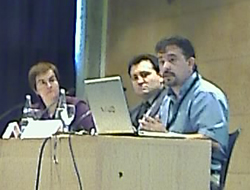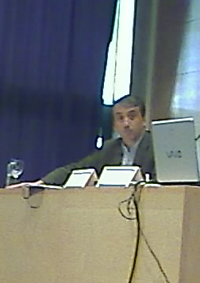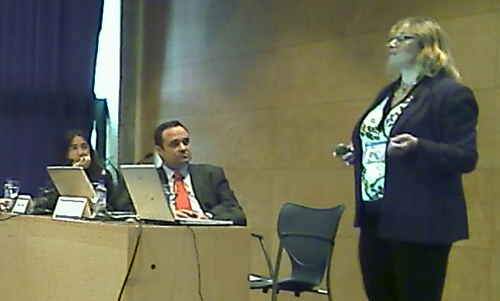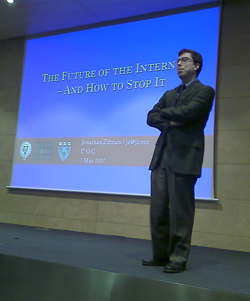By Ismael Peña-López (@ictlogist), 08 May 2007
Main categories: Cyberlaw, governance, rights, e-Government, e-Administration, Politics, Meetings, Participation, Engagement, Use, Activism
Other tags: idp, idp2007
No Comments »
The Congress on Internet, Law and Politics has the aim of continuing the task of reflecting on, analyzing and discussing the main changes taking place in law and politics in the information society. This third congress focuses on the questions that currently represent the most important challenges and new developments in the fields of copyright, data protection, Internet security, problems of responsibility, electronic voting, and the new regulation of e-Administration, as well as dedicating a specific area to the current state of the use of new technologies by law professionals.
Do we need e-voting?
Josep Maria Reniu, Professor of Political Sciences, University of Barcelona
 Left to right: Rosa Borge, Gerard Cervelló, Josep Maria Reniu
Left to right: Rosa Borge, Gerard Cervelló, Josep Maria Reniu
The digital evolution in the public arena is, clearly, slowed down by what happens with voting. And what is happening is, besides lots of pilot projects, few things: electronic voting is still in very early stages.
Nevertheless, the problem is neither lack of (pilot) experiences nor lack of tools and approaches, but a decisive step to implant e-voting. And the question is: do we really need e-voting?
Doubts on:
- Convenience + technooptimism: our actual system is simple [in Spain], thus there is “no need” to do it electronically in order to make it simpler. On the other hand, technological optimism needs reliability of the system, but it really is not that reliable.
- Cutting down costs: DREs are expensive. There still is paper as a voting receipt. And open source software is still not a standard, so customization is still expensive.
- More and better participation: experience have not demonstrated more or less participation. Pilot experiences replication causes weariness (“always experimenting, we want the real thing”). It is true that geographical distribution in participation has been improved.
- Elimination of invalid votes: not a doubt, but a statement. But, there are some voters that do want to express a null vote, hence, we are
- Democratic divide: due to digital divide.
- Security and voting guarantees: not 100% secure. Uncontrolled environments that do not guarantee free voting. Anonymity not guaranteed.
- Individual and collective verification: how to certify that one’s vote is there? And, on the other hand, free access to the source code is required to control the system… and one has to have the knowledge to understand it, so audits become non universal.
- Citizenship acceptation: technophobia, insecurity, lack of interest, tradition/liturgy.
Certainties on:
- Modernization of processes: flexibility of technology
- Cutting down on costs: paper
- increase of participation: some collectives such as expatriates. Appeal for youngest generations
- Several participative applications: languages, colors, etc.
- Need for an electronic ID card
- Need for specific voting authorities: competent to give confidence
- Coexistence of traditional voting and electronic voting: complementary, gradual
Conclusions: electronic voting does not solve anything; digital literacy is a need; a complementary solution; better participation will rely on better information of citizenship.
Secure Electronic Voting
Gerard Cervelló García, Public Administration Manager at SCYTL
What is not electronic voting: electronically managing votes at the backend system. By electronic voting we mean digitally expressing one’s vote.
[Gerard Cervelló gives an overview similar to Josep Maria Reniu’s. I’ll just add here the new topics, opinions, approaches]
Electronic voting offers fastest counting.
A smart option against the highest cost of DREs would be remote voting by means of personal computers, mobile phones or other devices that already exist in the hands (or in public centers such as libraries) of voters.
Requisites of electronic voting:
- usable: easy to understand
- accessible: for everyone
- available: no “sorry, I’m rebooting”
- reusable
- gives confidence: both to the voter and to the Administration
(Not) surprisingly, one of the barriers e-voting has to face is legal framework: most regulations for voting do not allow e-voting, because the way voting is described usually leave out i.e. remote voting, non paper voting, etc.
3rd Internet, Law and Politics Congress (2007)
By Ismael Peña-López (@ictlogist), 07 May 2007
Main categories: Cyberlaw, governance, rights, Meetings
Other tags: idp, idp2007
No Comments »
The Congress on Internet, Law and Politics has the aim of continuing the task of reflecting on, analyzing and discussing the main changes taking place in law and politics in the information society. This third congress focuses on the questions that currently represent the most important challenges and new developments in the fields of copyright, data protection, Internet security, problems of responsibility, electronic voting, and the new regulation of e-Administration, as well as dedicating a specific area to the current state of the use of new technologies by law professionals.
 John Palfrey
John Palfrey
[live simulation of somebody uploading copyrighted material to YouTube and the copyright holder’s lawyer and Google’s lawyer fighting one to each other. John Palfrey dynamizing the event and Jonathan Zittrain taking notes on a beamed PowerPoint presentation and putting all sort of things on a browser. Too good to describe it here in full detail ;D ]
Summing up: copyright has worked to distribute content under a scarcity model. Digital technologies have made scarcity an ancient thing, so we should be able to set up a new business model to get to people what they’re looking for without infringing the law, and by avoiding costly transaction costs (i.e. sues, punctual agreements, etc.)
3rd Internet, Law and Politics Congress (2007)
By Ismael Peña-López (@ictlogist), 07 May 2007
Main categories: Cyberlaw, governance, rights, Meetings
Other tags: idp, idp2007
1 Comment »
The Congress on Internet, Law and Politics has the aim of continuing the task of reflecting on, analyzing and discussing the main changes taking place in law and politics in the information society. This third congress focuses on the questions that currently represent the most important challenges and new developments in the fields of copyright, data protection, Internet security, problems of responsibility, electronic voting, and the new regulation of e-Administration, as well as dedicating a specific area to the current state of the use of new technologies by law professionals.
 Ramón García Albero
Ramón García Albero
It looks like consensus on ethics is weakening and people more and more rely on penal law as a moral meeting core and generator of ethics. This, of course, makes law be stronger, and puts the last resource that should be penal law in the front row.
On the other hand, the Internet has broken the lapse between “thought” and “action”. Now action immediately follows thought as it is just one click away. Before the Internet, crime required time, exposure. No more now. And indeed: there are no witnesses when one commits crime at home, there’s no one blaming, no one moralizing. It’s easy to discover the beast on one’s inside
.
Investigation in Internet: International police cooperation structures
Antonio López, National Police Force inspector, Europol liaison officer, Spanish Desk
Social reproach vs. penal reproach: some people tolerate some crime because, morally, it does not seem to be that bad.
In some types of crime (i.e. child pornography) the criminal not only performs the crime at home, (almost) anonymously, etc. but, also, he or she finds virtual communities, web pages, zillions of material that, somehow, legitimate his action and, hence, makes it look as non criminal.
The problem is that yes, monitoring each and everyone affects privacy and data security, but if there is no data retention, there is no Internet crime research and/or prosecution
. On the other hand, we’re just talking about log retention, not content retention.
On the 3rd IDP Congress on Internet, Law and Politics, see also:
3rd Internet, Law and Politics Congress (2007)
By Ismael Peña-López (@ictlogist), 07 May 2007
Main categories: Cyberlaw, governance, rights, Meetings
Other tags: idp, idp2007
No Comments »
The Congress on Internet, Law and Politics has the aim of continuing the task of reflecting on, analyzing and discussing the main changes taking place in law and politics in the information society. This third congress focuses on the questions that currently represent the most important challenges and new developments in the fields of copyright, data protection, Internet security, problems of responsibility, electronic voting, and the new regulation of e-Administration, as well as dedicating a specific area to the current state of the use of new technologies by law professionals.
Presentation of the session
Esther Mitjans i Perelló, Director of ACPD, the Catalan Data Protection Agency.
There is no more innocence assumption: everyone is potentially guilty, so everyone is watched at. And even worse: it is defended as a democratic action, as everyone is watched out equally.
 Left to right: Ricard Martínez, Ester Mitjans, Lucas Murillo, Yves Poullet
Left to right: Ricard Martínez, Ester Mitjans, Lucas Murillo, Yves Poullet
Technological landscape: ability to store speech, data, images or any combination; with more capacity on transmission, processing and storage; with almost absolute mobility. It is, hence, becoming more and more possible to literally digitally record the whole life of an individual.
Behind the screen, one actually connects to a lot of servers, besides just the website one intended to visit. And this depends on the technology, which is not neutral: while Mozilla Firefox filters (refuses) most of the connections one would be not aware of, Microsoft Internet Explorer just lets each and everyone in.
Besides privacy: the human dignity and the support of other fundamental liberties such as freedom of choice, of information, of expression.
A shift on Data Protection: from Privacy as a right to opacity, towards Data Protection (beyond Privacy) as a way for ensuring a better equilibrium between the informational powers of Data Control and Data Security (a positive approach). Is there a need, now, for a third generation on data protection?
Personal data has been since long centered on personal data, but now there is a need for a specific regulation of anchorage points (permit correlations) and contact points (i.e. cookies, traffic data and RFID), because identity is no more a prerequisite for data processing afecting individuals. We no more need to know who one person is to contact him or her, even not personally, but i.e. offering him something to buy that he might be interested in (and we even don’t know his name).
And indeed, there are also new actors that need being regulated. We should maybe go towards a system of “products liability” in case of implementation of non privacy compliant terminals.
And new objectives: right not to be excessively controlled, continuously exposed to advertising, etc. and over all, the right to remain anonymous, based on a functional non identifiability (which now the Internet mainly does not allow), a privacy compliant communication terminal.
Lucas Murillo, Supreme Court magistrate, Professor of Constitutional Law.
In his opinion the issue is not privacy itself, but data security, with special stress on those who manage important amounts of data: the Administration and some big private actors (ISPs and so on).
And even if Governments have done (more or less) their homework, private corporations (in general) have not. Hence, he believes that a strong State is absolutely necessary to enforce the Law, and private initiative and/or self-regulation either does not work or it is not guaranteed in front of the user/citizen. Of course, punishing is just the other side of information and good practices fostering.
There’s two options that one can deal with data: according to the law or with the owner’s consent. But consent is fragile: as data are priceless, data hunters set up procedures so tough that the user blindly accepts (consents) giving his data away.
On the other hand, the right of data protection can be understood so wide that maybe it could cover almost anything. It is now only related to communications, but some pressures (i.e. need of more data after 11S attacks to prevent terrorism) might make this constraints shift.
3rd Internet, Law and Politics Congress (2007)
By Ismael Peña-López (@ictlogist), 07 May 2007
Main categories: Cyberlaw, governance, rights, Meetings
Other tags: idp, idp2007
No Comments »
The Congress on Internet, Law and Politics has the aim of continuing the task of reflecting on, analyzing and discussing the main changes taking place in law and politics in the information society. This third congress focuses on the questions that currently represent the most important challenges and new developments in the fields of copyright, data protection, Internet security, problems of responsibility, electronic voting, and the new regulation of e-Administration, as well as dedicating a specific area to the current state of the use of new technologies by law professionals.
From Casual Censorship to Cartelisation? ISP Control of Illegal and Harmful Content
Lilian Edwards, Professor of Internet Law. Law School, University of Southampton
If you want to regulate content, you first go to Internet Service Providers (ISPs). And there is a big difference among information stored for transiently issues (transmission, caching) it becomes hosting, and thus legal issues apply.
A “notice and take down” regime, based on that there is no criminal liability if there is no atual knowledge of illegal activity or information, and no civil liability without actual knowledge or awareness of facts or circumstances from which illegal activity or information is apparent, and there is no active seek or profit.
But what really happens when a notice to take down takes place? What does the ISP do? What can be done? Are ISPs becoming “censors” or “arms of the state”? If they don’t do anything… are they pornographers? The AHRC Centre in IP and Technology carried on a survey to shred some light.
Institutionalisation: ISPs cut down costs of transaction of court procedures, as they easy enable both taking down i.e. pirate content and ID disclosing of major uploaders.
Cartelisation: The Internet Watch Foundation was originally created to defend ISP industry from threatened police action for carrying illegal newsgroup content. Thus, it acts as a self regulation device.
What’s next? potential for perfect invisible censorship? from self regulation to co-regulation? Specially when instead of child porn (the subject of IWF) we go no “not that clear” issues like racism or gender discrimination.
The results of the survey are not (statistically) significant, but (intuitively) quite enlightening. There are quite huge variations in the number of NTD claims received; traditional media usually get “defamation” complaints; etc. But… do they take down content? No, they not automatically do it. Instead of removing a whole website because of just one file (difficult for the ISP to find), they would “NTD” the owner of the site to do it in their place.
And no, ISPs don’t usually ask third parties (i.e. lawyers) if the NTD was legally right or appropriate, partly because there was not corporate people or knowledge about legal issues.
There is also little enthusiasm for “cartelised” behaviour.
On the other hand, main exchange of illegal content happens outside websites, but through instant messaging or P2P networks that make tracking very difficult. Hence, is there any sense on ISPs wasting their time in web filtering? And if this has a cost (as it does) and you have to cut down costs, where would you begin with if your core activity is in selling hosting, not in content controlling? But, surprisingly (from a profit point of view), ISPs actually care for “values”, and they care and collaborate because of personal bounds among flesh-and-bone persons ruling ISPs.
 Left to right: Raquel Xalabarder, Miquel Peguera, Lilian Edwards
Left to right: Raquel Xalabarder, Miquel Peguera, Lilian Edwards
Liability of middlemen: state of the question 5 years after the LSSICE
Miquel Peguera, Professor of Mercantile and New Technology Law, UOC School of Law
Professor Peguera explains some well-known court cases related to ISP liability in Spain.
One of the main things that he puts clear is that it does not seem that anyone (lawyers, judges, infringers and offended parties) is perfectly aware of how the law works, with stress in the point where there is or there is not liability for ISPs, which is specially sad in the case of lawyers and judges.
3rd Internet, Law and Politics Congress (2007)
By Ismael Peña-López (@ictlogist), 07 May 2007
Main categories: Cyberlaw, governance, rights, Hardware, Meetings
Other tags: idp, idp2007
No Comments »
The Congress on Internet, Law and Politics has the aim of continuing the task of reflecting on, analyzing and discussing the main changes taking place in law and politics in the information society. This third congress focuses on the questions that currently represent the most important challenges and new developments in the fields of copyright, data protection, Internet security, problems of responsibility, electronic voting, and the new regulation of e-Administration, as well as dedicating a specific area to the current state of the use of new technologies by law professionals.
One of the biggest struggles in History has been literacy. Now that that it seemed [at least in developing countries] that we had achieved some “good” literacy level, then comes the Internet and everyone has to get into digital literacy. Indeed, last year [2006] more transistors were produced than rice grains.
Data ownership goes back to the citizen. Data is not a Government property, but citizens’. the big challenge to e-Administration is not putting online all procedures, but making them disappear. An event (i.e. your husband’s death) should automatically activate all kind of procedures (i.e. widow subsidies) without the need of having to apply for them.
Universal access should cover telephony (both fixed and mobile lines), broadband, audiovisual services and content. This access means information, training and, actually, more democratic exercise, transparency, etc.
Keynote speech: The Future of Internet and How To Stop It
Jonathan Zittrain, Professor of Internet Governance and Regulation, Oxford Internet Institute
 Jonathan Zittrain
Jonathan Zittrain
One model of computer: in the hands of experts, you rent a solution, that comes from designing software and putting it into hardware, but you never ever approach neither the machine nor the design of the solution. This is IBM’s model when it was created back in the times of Herman Hollerith when he calculated the US 1890 census. IBM (then the Tabulating Machine Company) had “general purpose” machines that could be reprogrammed for whatever.
Flexowritter represented a second model: one solution, unchangeable, nonreprogrammable, but you could have it home.
Bill Gates made up a general purpose personal computer: it could be reprogrammed by the end user, that had the machine at home.
And the story with Networks is alike. Prodigy and Compuserve would show the user closed content depending on what he wanted (i.e. Weather) and who he was (i.e. Professional).
The birth of the Internet, the network its founders built, was totally open: it had an “hourglass” architecture where any use, any platform, were joined by a common “bypass”: IP, that just moved bits from one place to another.
And collaboration goes on an on. More and more software is built upon a “procrastination principle”: we build it until here and someone will go further
. But this kind of collaboration can also be subverted to break others’ barriers to secure their content, etc.
And now the problem is that you can not malicious code, malware, viruses, etc. from operating or entering your own system without being disconnected from the Network… or go out of the generative PC paradigm where everyone could program/contribute with his own code/content. If we are going back to the “main menu”, where all options are predetermined, is this the end of the generative Internet? actually, is this the end of the Internet itself? And same applies to who connects to what . It looks like our needs to “save” our systems, are creating more and more barriers similar to those of censorship (something dealt with at the OpenNet Initiative).
Stop BadWare is about writing a software that should help knowing how some other software works and whether it is making “happier” your computer (and its user).
The generative pattern:
- Origins in a backwater
- Ambitious but not fully planned: procrastination principle
- Contribution welcomed from all corners
- Success beyond expectation
- Influx of usage
- Success is cut short: movement towards enclosure
The solution? For the solution to be true to the generative pattern, it must be originated in a backwater. The Internet is an educative system: it does require to people to give feedback and build along with the others.
See also:
3rd Internet, Law and Politics Congress (2007)







